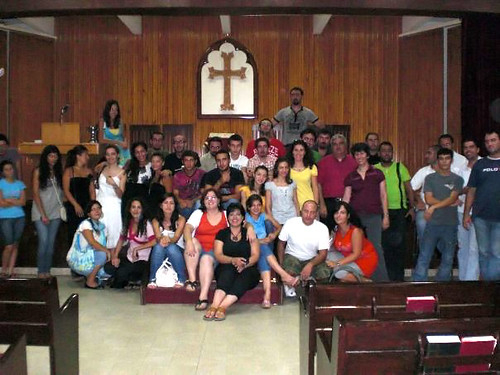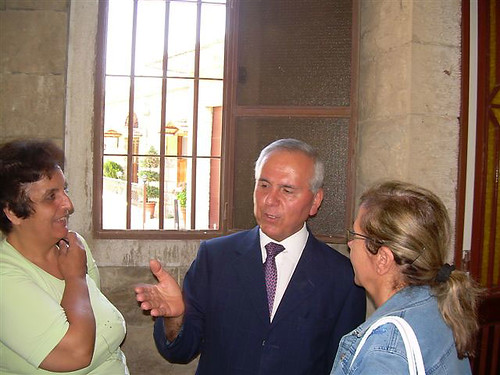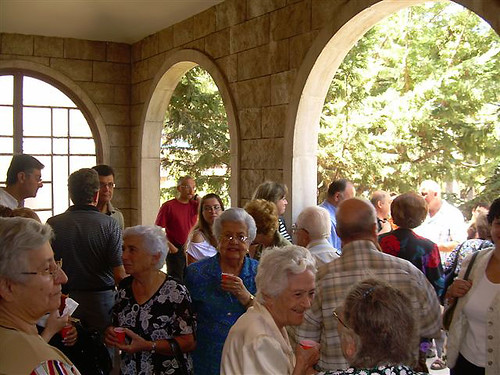Vahe
Vahe, the one and only blind person who attends Haigazian University, majors in psychology, gets around with an escort and always holds a black Samsonite. I had the honor to hold his hands for three and a half years ; hands that comforted me instead of me leading them as we went to and from classes, on the way to spiritual life meetings or to his usual sitting place in front of the admissions office. I remember the time when he passed his hands around my face to find out if the image he has of me is similar to what I really look like; this was after we went out from psychology of perception course.

Vahe (image courtesy of Ms. Araz Boutchakjian)
I witnessed the problems he had in his educational life; you can imagine how hard it was for Vahe to constantly search for people who have enough time to read the chapters for him or to take him from place to place; however, he never gave up. Many times I got upset in his place, yet he remained calm; even in his stress, he had this positive attitude that things will be okay. God’s presence with Vahe was very clear providing him with enough patience and serenity to go through the hard times he experienced.
During his last semester in university, Vahe found out that he had cancer. Can you think of a better timing? Or shall I say “the worst timing”?! many people prayed for him. Vahe was able to make it to graduation; he walked up to the stadium and got his diploma. Everybody were on their feet clapping and appreciating his strength and will power. I have never seen that amount of excitement showing in his facial expressions.
Few weeks later, he died. I struggled a lot with God, asking questions, wondering the reasons, demanding explanations. Why Vahe? Wasn’t it enough that he was blind and suffered a lot already? Couldn’t death find someone who suffered less than Vahe? As I was haunting myself with these thoughts and arguing with God, I remembered the book of Ecclesiastes in the Bible which states that anything might happen to anybody; Negative and positive incidents happen to both good and bad people. Laughter and tears are part of life. Death is also part of life; its forms might differ, yet death is inevitable for all. Knowing this fact doesn’t make Vahe’s death any less painful; however, it keeps me away from blaming God for what happened to Vahe because God is graceful and loving; He doesn’t work with punishment-reinforcement technique. God never creates negative situations; however, He is loving enough to make use of even the negative situations and make the best out of them. How do I know this? I know this through enjoying life with God and through trusting the following verse which is found in Romans 8:28 “and we know that in all things God works for the good of those who love Him, who have been called according to His purpose”.
Death may be an end to many things; an end to living with one’s family and friends; an end to walking in the same neighborhood; an end to being in the same body. What was death for Vahe? I don’t know, but I know that Vahe was a Christian believer, and for Christian believers, death is not THE END; it is a continuity of the journey they started with God.
It is true that Vahe’s life on earth is over; however, his spiritual life is in its greatest shape. He is with his Lord appreciating his eternal life and guess what? He is using his full sight.
It is a great accomplishment to be remembered positively while living; it is a greater accomplishment to be remembered after death. For me, Vahe’s death is a constant reminder of his life and of the foremost thing I learned from him: contentment.
I don't know the reasons behind his death, I can't understand or even accept; all I can do is pray that his death, like his life, be a wake-up call for the blind in spirit and for all of us to stop nagging and be content with the lives we have. Let us not worry for what we don’t have, but let us think of how we can make good use of what we have to be a refreshing example to others just like Vahe was, is and will remain a model of contentment to me.
Thank you Vahe.
Hagop Akbasharian,
Armenian Evangelical Marash Church, Chanitz member
NEST student


Vahe (image courtesy of Ms. Araz Boutchakjian)
I witnessed the problems he had in his educational life; you can imagine how hard it was for Vahe to constantly search for people who have enough time to read the chapters for him or to take him from place to place; however, he never gave up. Many times I got upset in his place, yet he remained calm; even in his stress, he had this positive attitude that things will be okay. God’s presence with Vahe was very clear providing him with enough patience and serenity to go through the hard times he experienced.
During his last semester in university, Vahe found out that he had cancer. Can you think of a better timing? Or shall I say “the worst timing”?! many people prayed for him. Vahe was able to make it to graduation; he walked up to the stadium and got his diploma. Everybody were on their feet clapping and appreciating his strength and will power. I have never seen that amount of excitement showing in his facial expressions.
Few weeks later, he died. I struggled a lot with God, asking questions, wondering the reasons, demanding explanations. Why Vahe? Wasn’t it enough that he was blind and suffered a lot already? Couldn’t death find someone who suffered less than Vahe? As I was haunting myself with these thoughts and arguing with God, I remembered the book of Ecclesiastes in the Bible which states that anything might happen to anybody; Negative and positive incidents happen to both good and bad people. Laughter and tears are part of life. Death is also part of life; its forms might differ, yet death is inevitable for all. Knowing this fact doesn’t make Vahe’s death any less painful; however, it keeps me away from blaming God for what happened to Vahe because God is graceful and loving; He doesn’t work with punishment-reinforcement technique. God never creates negative situations; however, He is loving enough to make use of even the negative situations and make the best out of them. How do I know this? I know this through enjoying life with God and through trusting the following verse which is found in Romans 8:28 “and we know that in all things God works for the good of those who love Him, who have been called according to His purpose”.
Death may be an end to many things; an end to living with one’s family and friends; an end to walking in the same neighborhood; an end to being in the same body. What was death for Vahe? I don’t know, but I know that Vahe was a Christian believer, and for Christian believers, death is not THE END; it is a continuity of the journey they started with God.
It is true that Vahe’s life on earth is over; however, his spiritual life is in its greatest shape. He is with his Lord appreciating his eternal life and guess what? He is using his full sight.
It is a great accomplishment to be remembered positively while living; it is a greater accomplishment to be remembered after death. For me, Vahe’s death is a constant reminder of his life and of the foremost thing I learned from him: contentment.
I don't know the reasons behind his death, I can't understand or even accept; all I can do is pray that his death, like his life, be a wake-up call for the blind in spirit and for all of us to stop nagging and be content with the lives we have. Let us not worry for what we don’t have, but let us think of how we can make good use of what we have to be a refreshing example to others just like Vahe was, is and will remain a model of contentment to me.
Thank you Vahe.
Hagop Akbasharian,
Armenian Evangelical Marash Church, Chanitz member
NEST student

Նուիրուած Վահէին Յիշատակին
This Armenian poem is dedicated to Vahe, a young man, who was born blind, who attended the Haigazian University, and was able to graduate, after conquering many difficulties, only for cancer to take his life after one week of his graduation. His life touches many...
Հարց տուինք ինչո՞ւ ասանկ եղաւ, հազիւ թէ հասաւ գագաթին, մահն եկաւ իրեն առաւ տարաւ:
Ըսինք ինչպէ՞ս կրնայ իր ուսումը շարունակել, առանց տեսողութեան իր առօրեան անցնել:
Արդեօ՞ք պիտի կրնայ հասնիլ, անցնել քննութիւնները իր:
Մենք որ կը գանգատինք ամէն ինչին, ուր մնաց ինք որ կը դիմագրաւէ իր հարցերը առանցին:
Անցան գացին օրերը, ու հասաւ բարաց այդ օրը:
Ելաւ Վահէն բեմին վրայ, ելան մարդիկ ոտքի վրայ:
Ծափն ու սլոցը ամէն կողմէն, կը լսուէր բարձրաձայն ու աշխոյժօրէն:
Չի կրցայ զսպել իմ տրտունչը, իջաւ առաջին իմ արցունքը:
Հաւատացի որ Աստուած կայ, ով Տէր այսպիսի բան կ՛ըլլա՞յ:
Հարց տուի ինչո՞ւ ասանկ եղաւ, հազիւ թէ հասաւ գագաթին, մահն եկաւ իրեն առաւ տարաւ:
...
Գնաց, գնաց երբ դեռ երիտասարդ էր, երբ դեռ նոր յաղթած էր,
երբ դեռ բոլորս ապշեցուցած էր:
Գնաց առանձին, գնաց մինակ, բայց գնաց խիզախ ու ճակատաբաց,
ձգելով մեզ բոլորս բերանաբաց:
Ձգեց ամէն մէկուս քով հետք մը, թաքնուած յատուկ տեղ մը,
հոն ուր հոգին կ՛երերայ, հոն ուր հոգին շունչ կը ստանայ:
Գնաց... գնաց... գնաց Վահէն:
Ռաֆֆի Չիլինկիրեան

Հարց տուինք ինչո՞ւ ասանկ եղաւ, հազիւ թէ հասաւ գագաթին, մահն եկաւ իրեն առաւ տարաւ:
Ըսինք ինչպէ՞ս կրնայ իր ուսումը շարունակել, առանց տեսողութեան իր առօրեան անցնել:
Արդեօ՞ք պիտի կրնայ հասնիլ, անցնել քննութիւնները իր:
Մենք որ կը գանգատինք ամէն ինչին, ուր մնաց ինք որ կը դիմագրաւէ իր հարցերը առանցին:
Անցան գացին օրերը, ու հասաւ բարաց այդ օրը:
Ելաւ Վահէն բեմին վրայ, ելան մարդիկ ոտքի վրայ:
Ծափն ու սլոցը ամէն կողմէն, կը լսուէր բարձրաձայն ու աշխոյժօրէն:
Չի կրցայ զսպել իմ տրտունչը, իջաւ առաջին իմ արցունքը:
Հաւատացի որ Աստուած կայ, ով Տէր այսպիսի բան կ՛ըլլա՞յ:
Հարց տուի ինչո՞ւ ասանկ եղաւ, հազիւ թէ հասաւ գագաթին, մահն եկաւ իրեն առաւ տարաւ:
...
Գնաց, գնաց երբ դեռ երիտասարդ էր, երբ դեռ նոր յաղթած էր,
երբ դեռ բոլորս ապշեցուցած էր:
Գնաց առանձին, գնաց մինակ, բայց գնաց խիզախ ու ճակատաբաց,
ձգելով մեզ բոլորս բերանաբաց:
Ձգեց ամէն մէկուս քով հետք մը, թաքնուած յատուկ տեղ մը,
հոն ուր հոգին կ՛երերայ, հոն ուր հոգին շունչ կը ստանայ:
Գնաց... գնաց... գնաց Վահէն:
Ռաֆֆի Չիլինկիրեան

Our Article "Հայերէն Գրենք Հայկական Տառեր Օգտագործելով" Get Republished in Azad-Hye Magazine
Our article Հայերէն Գրենք Հայկական Տառեր Օգտագործելով gets published in Azad-Hye Magazine, a Middle East Armenian Portal, based in UAE. This article was first published in Chanitz blog, then in Aztag Armenian newspaper, then in RAG Mamoul. It was also distributed worldwide through email forwards, about which we knew through a French Armenian doctor.
You can find this article at the following link -> http://www.chanitz.org/2009/05/blog-post_16.html

You can find this article at the following link -> http://www.chanitz.org/2009/05/blog-post_16.html

Interview with Mr. Harout Nersessian About the Mission of AMAA in Armenia
- When and in what conditions did AMAA embark on its mission in Armenia?
- What does AMAA do today in Armenia?
- Are there any schools and organizations that AMAA supports?
- What about the spiritual dimension of the work of AMAA?
- What is your opinion about our Chanitz blog?
You will listen to the answers to these question that Hagop raised with Mr. Harout Nersessian. The interview is in Armenian.
CHANAGHPOUYR Team
Rev. Nerses and Sevan Balabanian with the Chanitzagans
Rev. Nerses and Mrs. Sevan Balabanian along with their daughter Nanor visited the Chanitz youth group of Emmanuel Church. Rev. Nerses shared with the youth about his ministry in San Francisco, and had fellowship with the youth. Chanitzagans from Ashrafieh Church also were present, as well as Nanor's classmates and friends.




Pictures from Mrouj Sunday Service
Cappadocia the Underground City in Turkey

For more information, follow the link or picture:
http://www.hottnez.com/cappadocia-valley-and-its-hidden-geological-beauty/

Rev. Nerses Balabanian Preaching in Emmanuel Church
Living the Big Picture of Serving in our Community

Each hour that you pour yourself into the lives of the youth, remember that you are snatching an hour from their experiment with drugs, violence, addiction, street fights, emptiness, boredom... Many of our youth today have an emptiness, and lots of questions. They are aware of the outside dangers, however, once they find a relationship that can fill their emptiness, they will go for it. This is why we need to keep our hearts open for the youth, to be with them, and allow them to make mistakes, to help them stand up again and continue the path of their faith, to maturity.
However, we need to believe that we are the salt and the light, and that we are doing His work, His will, and that we serve His big vision. The hour that we're spending with the youth, specially junior youth, is not in vain, it is for the development of the spiritual dimension, for the special and personal relationship with God.
That is the big picture that Christ invited us to share when he narrated about the Good Samaritan, the great question of Who Is My Friend? The kids, the youth have the thirst for relationships, for grown-ups to spend time with them, to love them, to advise them. They are not shy about it as we were in our times. Today, they come to you and they tell you that they want to spend their time with you, to learn from you, to become your mentee. You are special in their lives.
Along this path, we are not perfect and we will never be, and they need to see that you are not perfect, however, what they need to see more is that you are working on yourself, you are thriving to be better, to walk your talk, and keep your faith alive. You are part of His vision, and we are not alone in this path. Our relationship with Him will reflect in our relationship with our youth.
Raffi Chilingirian
















